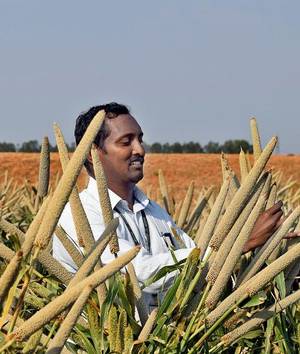
Iron and zinc levels increased using conventional breeding methods: scientist
Consuming supplementary nutrients for better health has become common. Making it more convenient, the Indian Council of Agricultural Research (ICAR) has promoted project to include the micro-nutrients in millets.
The ICAR has set minimum levels of iron and zinc that have to be bred into the varieties of pearl millet (Bajra) available across the country. The scientists at a national-level workshop, part of the All-India Coordinated Research Project on Pearl Millet, early this year decided a minimum of 4.2 milligrams of iron per 100 grams and zinc 3.2 milligrams per 100 grams. Any variety or hybrids to be sold to farmers by public or private seed producers should follow this micro-nutrient standards apart from giving a higher yield.
Dhanashakti — the first bio-fortified pearl millet variety released in 2014 — has been a grand success and is currently being cultivated in 65,000 hectares across the country and the seed is largely being supplied by Nirmal Seeds, Maharashtra State Seed Corporation and Karnataka State Seed Corporation. The International Crops Research Institute for Semi-Arid Tropics (ICRISAT) here has recently developed four bio-fortified pearl millet hybrids with iron and zinc — the most deficient nutrients in current diets.
The hybrids are — AHB 1200 Fe, HHB 299, RHB 233 and HHB 311 — officially released in collaboration with agricultural universities of Maharashtra (VNMKV), Haryana (CCSHAU), Rajasthan (SKNAU).
These bio-fortified varieties and hybrids will contain 7.5 to 8.0 milligrams of iron per 100 grams and 3.5 to 4.5 milligrams of zinc per 100 grams of millet.
So, consumption of 200 g/day bio-fortified bajra-based foods will provide almost 70% of daily iron and zinc requirement in men and women, and 130 gram will give 100% requirement for children.
“It took more than five years to develop these varieties with active support of ICAR and State agricultural universities. These varieties of pearl millet will offer nutrient rich food to the consumers. Minimum nutrient level has been standardized after examining as many as 120 varieties bajra across the country, ICRISAT Senior Scientist Mahalingam Govindaraj told The Hindu.
Key vitamins
“Bio-fortification is conventional crop breeding to increase micro-nutrient levels. It helps to address preventable deficiencies of key vitamins and minerals like iron, zinc and vitamin A. This project was supported by HarvestPlus Challenge program of CGIAR,” he explained.
“Since the seeds have been developed in conventional breeding method there is no need to worry. This is an excellent move in the background of malnutrition levels in India – with over 58 % of children and 50 % of pregnant women being anaemic in India, further, 38 % of children under five are stunted,” he explained.
source: http://www.thehindu.com / The Hindu / Home> News> Cities> Hyderabad / by R. Avadhani Pattancheru (Sangareddy Dt.) / June 05th, 2018